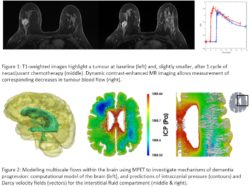Deep learning models of multiscale fluid transport for characterising treatment response in tumours
- Academic lead
- Zeike Taylor (Mechanical Engineering)
- Co-supervisor(s)
- David Buckley (Medicine), Ali Gooya (Computing)
- Project themes
- Biomedical Flows
Tumour blood supply and interstitial flow play essential roles in tumour growth, invasion, and response to treatments like chemotherapy. This project is motivated by a need for better understanding of the mechanisms underpinning these roles, so that this knowledge can be used in conjunction with imaging measurements to discover better indicators of early response to treatment (Fig 1). Such indicators are vital for monitoring and optimising individualised treatments; treatments that don’t produce a good response often cause unnecessary side effects and delay the start of effective treatment.
The project has two main aims: 1) formulating models of fluid transport at different spatial scales and of microstructural change using multiple-network poroelastic theory (MPET); and 2) creating so-called domain-aware deep learning models that can accelerate these complex flow and remodelling predictions. MPET has recently been used to create models of multiscale flow within the brain for exploring mechanisms of dementia progression (Fig 2). Its application to tumour modelling, and expansion to encompass response-related tissue remodelling is entirely new. Model acceleration using deep neural networks is a rapidly developing concept that here will enable simulations to be created and executed at scale.

